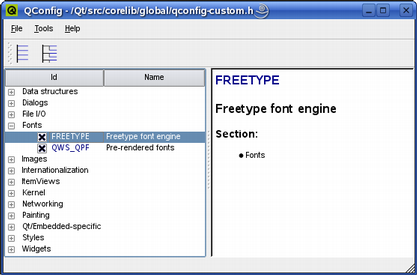Qt for Embedded Linux Fonts
|
| Optimization The FreeType, QPF2 and QPF formats are features that can be disabled using the feature definition system, reducing the size of Qt and saving resources. Note that at least one font format must be defined. See the Fine-Tuning Features in Qt for Embedded Linux documentation for details. |  |
All supported fonts use the Unicode character encoding. Most fonts available today do, but they usually don't contain all the Unicode characters. A complete 16-point Unicode font uses over 1 MB of memory.
FreeType Formats
The FreeType 2 library (and therefore Qt for Embedded Linux) can support the following font formats:
- TrueType (TTF)
- PostScript Type1 (PFA/PFB)
- Bitmap Distribution Format (BDF)
- CID-keyed Type1
- Compact Font Format (CFF)
- OpenType fonts
- SFNT-based bitmap fonts
- Portable Compiled Format (PCF)
- Microsoft Windows Font File Format (Windows FNT)
- Portable Font Resource (PFR)
- Type 42 (limited support)
It is possible to add modules to the FreeType 2 font engine to support other types of font files. For more information, see the font engine's own website: http://freetype.sourceforge.net/freetype2/index.html.
Glyphs rendered using FreeType are shared efficiently between applications, reducing memory requirements and speeding up text rendering.
Qt Prerendered Font (QPF2)
The Qt Prerendered Font (QPF2) is an architecture-independent, light-weight and non-scalable font format specific to Qt for Embedded Linux.
Nokia provides the cross-platform makeqpf tool, included in the tools directory of both Qt and Qt for Embedded Linux, which allows generation of QPF2 files from system fonts.
QPF2 supports anti-aliasing and complex writing systems, using information from the corresponding TrueType font, if present on the system. The format is designed to be mapped directly to memory. The same format is used to share glyphs from non-prerendered fonts between applications.
Legacy Qt Prerendered Font (QPF)
Nokia provides support for the legacy QPF format for compatibility reasons. QPF is based on the internal font engine data structure of Qt/Embedded versions 2 and 3.
Note that the file name describes the font, for example helvetica_120_50.qpf is 12 point Helvetica while helvetica_120_50i.qpf is 12 point Helvetica italic.
The Legacy fontdir File
For compatibility reasons Qt for Embedded Linux supports the fontdir file, if present. The file defines additional fonts available to the application, and has the following format:
name file renderer italic weight size flags
| Field | Description |
|---|---|
| name | The name of the font format, e.g.,Helvetica, Times, etc. |
| file | The name of the file containing the font, e.g., helvR0810.bdf, verdana.ttf, etc. |
| renderer | Specifies the font engine that should be used to render the font, currently only the FreeType font engine (FT) is supported. |
| italic | Specifies whether the font is italic or not; the accepted values are y or n. |
| weight | Specifies the font's weight: 50 is normal, 75 is bold, etc. |
| size | Specifies the font size, i.e., point size * 10. For example, a value of 120 means 12pt. A value of 0 means that the font is scalable. |
| flags | The following flag is supported:
All other flags are ignored. |
| Cette page est une traduction d'une page de la documentation de Qt, écrite par Nokia Corporation and/or its subsidiary(-ies). Les éventuels problèmes résultant d'une mauvaise traduction ne sont pas imputables à Nokia. | Qt qtextended4.4 | |
| Copyright © 2012 Developpez LLC. Tous droits réservés Developpez LLC. Aucune reproduction, même partielle, ne peut être faite de ce site et de l'ensemble de son contenu : textes, documents et images sans l'autorisation expresse de Developpez LLC. Sinon, vous encourez selon la loi jusqu'à 3 ans de prison et jusqu'à 300 000 E de dommages et intérêts. Cette page est déposée à la SACD. | ||
| Vous avez déniché une erreur ? Un bug ? Une redirection cassée ? Ou tout autre problème, quel qu'il soit ? Ou bien vous désirez participer à ce projet de traduction ? N'hésitez pas à nous contacter ou par MP ! | ||
Copyright © 2000-2012 - www.developpez.com



















